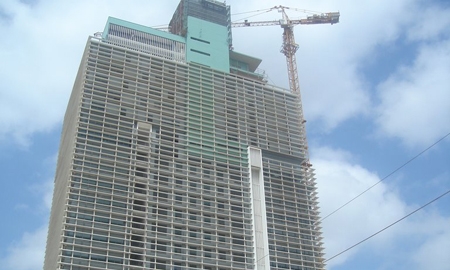During Angola’s long civil conflict which ran from 1975 until 2002, many buildings and roads throughout the country were either destroyed or severely damaged. The Angolan government and some businesses are now taking advantage of the country’s vast wealth from oil and diamond mining industries to construct new houses, factories, schools, hospitals and roads. The recent boom in the construction industry is not only to rectify any permanent damage left by the civil war, but is also a response to Angola’s rapidly expanding population. One third of the country’s inhabitants now live in the capital, Luanda which housed 400,000 people in 1974 but is now home to almost 6 million. The city’s infrastructure is yet to catch up with this massive increase in population. In 2007 Angola played host to the African Basketball Championship, affectionately known as Afrobasket, and 2010 saw them host the Africa Cup of Nations, the main international football competition in Africa. Hosting these sporting events left the country with modern sporting facilities including four new stadiums, as well as upgrades to the country’s international airports and hotel facilities. The lives of normal Angolans have been drastically improved over the past decade with the government spending huge amounts of the country’s new found wealth on various initiatives throughout the nation. These have included $176 million over the past 15 years on social, community and production projects, $5 billion on infrastructure in the Zaire province, and $153 million on improvements to Luanda’s international airport.
“Angola is living in a new era in which its children are returning back to the motherland and the country itself is being led to a new kind of thinking, understanding and a new concept of living.” Gilberto Rodrigues, Chairman of Mota-Engil Angola |
In October of 2010,
Mota-Engil, a Portuguese industrial conglomerate specialising in civil engineering and infrastructure, set up an Angolan unit of their multinational company – Mota-Engil Angola. The main shareholders included BPA - Banco Privado Atlantico, Sonangol - an Angolan gas and oil company, and the Portuguese company itself, Mota-Engil. Although Mota-Engil Angola was only established very recently, the company has a long history with the country of Angola dating back to when the the south west African nation was still a Portuguese colony. Mota-Engil even maintained operations in the country throughout the civil conflict which puts them in a unique position having a deep understanding of how to operate in the country as well as a commitment to helping it advance. “Angola is living in a new era in which its children are returning back to the motherland and the country itself is being led to a new kind of thinking, understanding and a new concept of living.” explains Gilberto Rodrigues, the chairman of Mota-Engil Angola “We are committed to quality and are not here for easy profits. Mota-Engil has been present in Angola for over 64 years, the Mota family is the biggest shareholder in the Group and they want to continue to be so for many more years. We have a history and a background of quality that we want to keep intact for the future.”
Angola’s housing market suffered greatly during the country’s 27 year long conflict, not only due to physical damage but because the government diverted available funds away from building development to its armed forces and discouraged private investment in housing. In the past few years Angola has seen strong and steady economic growth which has gone some way to addressing the country’s housing shortfall. However the Ministry of Urban Affairs in Luanda currently calculates that the city needs to construct at least 65,000 new dwellings each year until 2016 in order to cope with the rapid population growth in the capital, which is already home to almost 6 million inhabitants. The
Institute of Urban Planning and Management of Luanda (
IPGUL) in Angola has stated that foreign investment in real estate grew 20 per cent in 2007 and 18 per cent in 2008 before being affected by the global economic slowdown of 2009, but the office are still confident that real estate investment will grow by at least 10 per cent this year and next. At present the Institute of Urban Planning and Management are working on plans to construct a residential area of 500,000 square meters in Luanda which would result in an increase of over one million square meters to the available housing space within the city. Chairman of Mota-Engil Angola, Gilberto Rodrigues, is confident that the international conglomerate will continue to grow alongside the Angolan economy, currently one of the strongest in the world, “The company has grown maybe around 500 per cent in the past five years, even during the financial crisis time we managed to grow a bit more. I would say that the company in five year’s time is to double its size, at least.”

0 COMMENTS